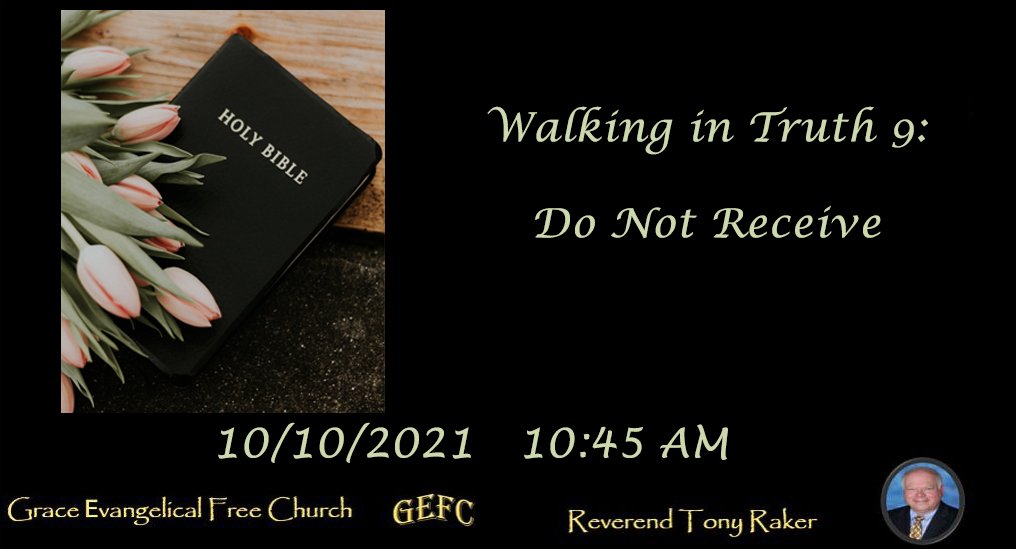
Grace Evangelical Free Church October 10, 2021
Walking in Truth 9: Do Not Receive
The Apostle John addresses believers in Christ to reject association with wrong teaching.
2 John 1:10: “If anyone comes to you and does not bring this teaching, do not receive him into your house or give him any greeting”
- Grammatical Usage: “receive” or in the Greek, “lambano” meaning, “actively prohibited contact”; “greeting” or “chairó” meaning, “salute; greet”.
- Literal Interpretation: If anyone comes to you and does not bring this teaching, do not have contact in any form with him, including into your home, and do not salute him
- Contextual/Comparison: God keeps His Word: God continually uses His Word. Many in society today want to view themselves as “tolerant.” By that they usually mean “I accept people for who they are without passing judgment on any action or lifestyle choice.” But the biblically informed Christian cannot, in good conscience, approve of all actions or lifestyle choices; the Bible clearly delineates some lifestyles as sinful and displeasing to God as well as those who promote them. How are we to handle such?
• Inquire: If, for example, a Jehovah’s Witness or Mormon comes knocking, John instructs us ask about their view of Jesus Christ and theology in general;
• Judge: Based upon v 9a, do they prove heretical – wrong in their view of Christ and orthodox theology?
• Act: If so, do not entertain them. In fact, do not even bid them a good day (2 Corinthians 6:4-18)
John’s instruction is couched today as social bigotry and intolerance:
• But no true Christian can tolerate a teaching or teacher that misrepresents Jesus or God’s Word
• The modern Church is weak because it has become tolerant of false teaching
• By contrast, divisions among the body of Christ stops God’s work through us, turning our focus inward rather than outward toward others. Christ’s church consists of all believers; we have been baptized into His body and gifted in various ways to benefit that body (1 Corinthians 12:7–11, 13). When we work together, rather than each one seeking his or her own agenda, we accomplish more for God’s kingdom. This includes differences of opinion on peripheral questions as opposed to primary doctrinal positions. “How good and pleasant it is when God’s people live together in unity!” (Psalm 133:1)
• When a Christian’s convictions clash with the standard of tolerance set by society, the Christian is often labeled as “intolerant,” “bigoted,” or worse. Ironically, those who claim to be the most tolerant are the least tolerant of the Christian worldview.
• A general principle that covers many issues was expressed by Peter before the Sanhedrin: “We must obey God rather than human beings!” (Acts 5:29). Whatever pressure society brings to bear, the follower of Christ knows who his Lord is and chooses to obey Him. In a sinful world that hated Christ, this will naturally lead to some conflict. The “tolerance” espoused by the world leaves no room for Christian convictions, but, for the redeemed who walk in the Spirit, Christian convictions are indispensable. The Bible says there is a right and a wrong, and no amount of sensitivity training or encounter group sessions can change that.
• If we define tolerate as “to put up with something one does not like,” then we could say that tolerance does not require approval or support. In this sense, Christians ought to be as tolerant as possible, in order for our loving character to be visible to all (Matthew 5:16). We should be able to “put up with” a lot. In most cases, we should be able to control our impulse to resent something we find distasteful
• The problem comes when “tolerate” is defined in a manner that implies an acceptance or even approval of what one finds offensive. A Christian with Bible-based convictions can accept the fact that people sin, but he must still call it “sin.” A Christian’s convictions do not allow approval of sin whatsoever
• When a believer finds that his Christian convictions are in conflict with someone’s take on tolerance, he should immediately do the following things: 1) Pray for wisdom and for courage. 2) Examine his convictions to make sure they are based on what the Bible actually says, rather than personal preferences. Taking a stand against having a joint Hindu-Christian worship service is biblically supportable; taking a stand against
serving ethnically diverse food at the church potluck is not. 3) Commit himself to loving his enemies and doing good to them (Matthew 5:38–48).
• Purpose in his heart to engage the conflict “with compassion, kindness, humility, gentleness and patience” (Colossians 3:12). 5) If legal issues come into play, explore his rights under the law (see Acts 16:37–38; 21:39)
• Even in the midst of a conflict between godly convictions and secular tolerance, Christians must demonstrate Christ’s love and righteousness, exemplifying how truth and love can coexist. In every situation, we should exhibit “deeds done in the humility that comes from wisdom” (James 3:13). Our conduct should be such “that those who speak maliciously against [our] good behavior in Christ may be ashamed of their slander” (1 Peter 3:16)
• However, personally, John’s instruction must be applied: do not engage or entertain per v 9a. In fact, do not even wish them a good day.
Conclusion: Standing up for Jesus is an imperative? Where do you stand?
